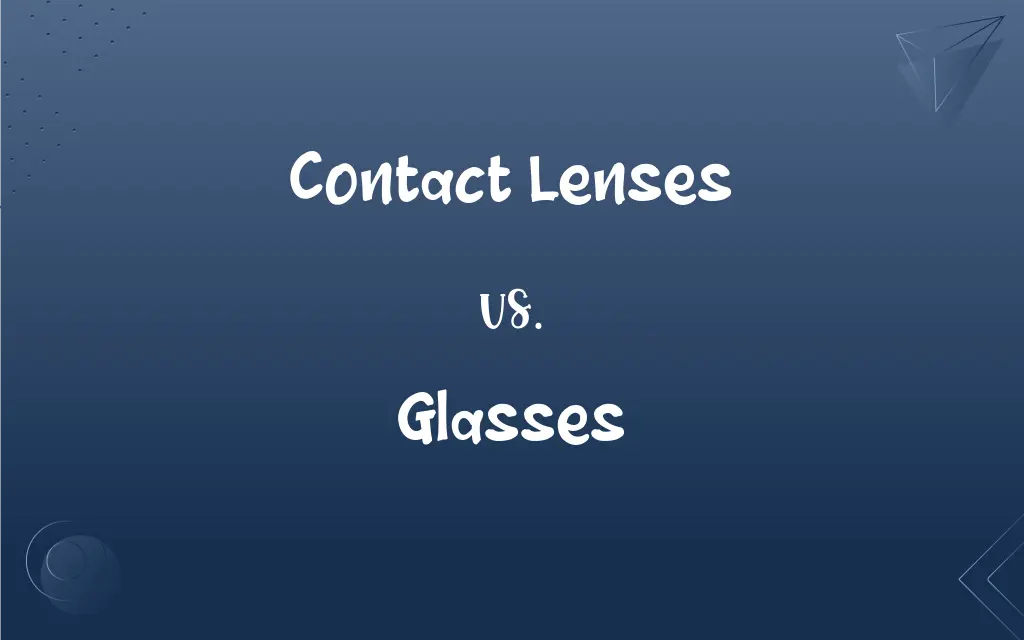Contact Lenses vs. Glasses: What's the Difference?
Edited by Aimie Carlson || By Harlon Moss || Published on July 31, 2024
Contact lenses are thin lenses placed directly on the eye surface for vision correction, while glasses are eyewear with lenses mounted in a frame to correct vision.

Key Differences
Contact lenses offer a direct vision correction method by sitting directly on the eye's surface. They conform to the curvature of the eye, providing a wider field of view and less vision distortion than glasses. Glasses, on the other hand, are frames holding prescription lenses worn in front of the eyes. They are simpler to use and maintain than contact lenses, requiring only occasional cleaning and adjustments.
Contact lenses can correct a range of vision problems, including myopia, hyperopia, astigmatism, and presbyopia, without altering the wearer's appearance. They also offer the advantage of not changing how the world looks in size, which glasses might do due to lens distortion. However, contacts might not be suitable for everyone, including those with dry or sensitive eyes or those who cannot commit to the necessary care routine.
Glasses can provide a level of comfort for users who find contact lenses uncomfortable due to dry eyes or allergies. They can be easily put on and taken off, making them a convenient choice for those with a less active lifestyle or for whom hygiene and lens maintenance are concerns. Additionally, glasses can accommodate thicker lenses for more severe vision problems without discomfort, which might not be possible or comfortable with contact lenses.
Both contact lenses and glasses have their pros and cons, depending on the user’s lifestyle, preferences, vision needs, and comfort. While contact lenses offer convenience and cosmetic advantages for active individuals, glasses provide ease of use, low maintenance, and the ability to quickly correct vision for reading or computer work.
Comparison Chart
Placement
Directly on the eye
In front of the eyes in a frame
ADVERTISEMENT
Field of Vision
Wider, no frame obstruction
Can be limited by frames
Maintenance and Hygiene
Requires daily cleaning and proper storage
Simple cleaning, less intensive care
Physical Activity Suitability
More stable, suitable for active lifestyles
Can slip or move, less ideal for sports
Aesthetic and Comfort
Invisible, no pressure on nose or ears
Visible, can make fashion statement
Cost and Replacement
Recurring cost for disposables or maintenance
One-time cost, less frequent replacement
ADVERTISEMENT
Suitability for Dry Eyes
May cause discomfort or require special types
Often more comfortable for dry eyes
Protection
No physical protection against wind or debris
Can protect eyes from environmental elements
Contact Lenses and Glasses Definitions
Contact Lenses
Contact lenses enhance peripheral vision by conforming to the eye's curvature.
With contact lenses, he noticed an improved field of view while driving.
Glasses
Glasses can feature specialized lenses, such as bifocals or progressives, for multiple vision corrections.
She opted for progressive lenses in her glasses to avoid switching between reading and distance glasses.
Contact Lenses
Contact lenses are thin optical discs applied directly to the eye for vision correction.
She switched to contact lenses to avoid the hassle of wearing glasses during sports.
Glasses
Glasses are eyewear with lenses set in a frame to correct or enhance vision.
He chose glasses with a minimalist design to match his professional demeanor.
Contact Lenses
Contact lenses are available in various types, including daily, monthly, and extended wear.
He prefers daily disposable contact lenses for their convenience and hygiene.
Glasses
Glasses can serve as a fashion accessory while providing necessary vision correction.
Her glasses added a sophisticated touch to her overall look.
Contact Lenses
Contact lenses can also be used for cosmetic purposes to change eye color.
She wore colored contact lenses to complement her outfit for the evening.
Glasses
Glasses are suitable for people of all ages and can correct various vision problems.
The child got his first pair of glasses to correct his nearsightedness.
Contact Lenses
Contact lenses require careful hygiene practices to prevent eye infections.
She meticulously cleaned her contact lenses every night before bed.
Glasses
Glasses provide physical protection against environmental factors like dust and debris.
His glasses shielded his eyes from the dust stirred up during the hike.
Glasses
Any of a large class of materials with highly variable mechanical and optical properties that solidify from the molten state without crystallization, are typically made by silicates fusing with boric oxide, aluminum oxide, or phosphorus pentoxide, are generally hard, brittle, and transparent or translucent, and are considered to be supercooled liquids rather than true solids.
FAQs
What are glasses?
Eyewear with prescription lenses mounted in a frame for vision correction.
What are contact lenses?
Thin lenses placed directly on the eye to correct vision.
Can I sleep in my contact lenses?
Only if they are specifically designed for overnight wear, but it's generally not recommended.
Do contact lenses require special care?
Yes, they must be cleaned and stored properly to avoid eye infections.
Can anyone wear contact lenses?
Most people can, but it depends on individual eye health and lifestyle needs.
How often should I replace my contact lenses?
Depends on the type: daily, weekly, monthly, or as recommended by an eye care professional.
Are glasses more affordable than contact lenses?
Initially, glasses may be more expensive, but over time, the recurring cost of contact lenses can be higher.
Can I wear contact lenses if I have dry eyes?
Yes, but you might need specific types designed for dry eyes.
Are there contact lenses that can change my eye color?
Yes, colored contact lenses can change or enhance your eye color.
Are glasses or contact lenses better for sports?
Contact lenses are often preferred for their stability and wider field of view.
How do I know if glasses or contact lenses are better for me?
Consider lifestyle, comfort, budget, and consult with an eye care professional.
Can glasses correct all types of vision problems?
Glasses can correct most common vision issues, including nearsightedness, farsightedness, and astigmatism.
How long does it take to get used to glasses?
It varies, but most people adjust within a few days to a week.
Can I switch between glasses and contact lenses?
Yes, many people switch between the two depending on the situation.
Are there bifocal or multifocal contact lenses?
Yes, they are designed to correct multiple vision problems at once.
Do I need a separate prescription for glasses and contact lenses?
Yes, because the measurements and requirements differ for each.
What should I do if my contact lenses cause discomfort?
Remove them immediately and consult with an eye care professional.
Do glasses offer UV protection?
Many lenses have UV protection built-in, but not all, so check with the manufacturer.
Can glasses be adjusted for a better fit?
Yes, most optical shops can adjust frames for comfort.
Can I wear makeup with contact lenses?
Yes, but always put contacts in before applying makeup to avoid contamination.
About Author
Written by
Harlon MossHarlon is a seasoned quality moderator and accomplished content writer for Difference Wiki. An alumnus of the prestigious University of California, he earned his degree in Computer Science. Leveraging his academic background, Harlon brings a meticulous and informed perspective to his work, ensuring content accuracy and excellence.
Edited by
Aimie CarlsonAimie Carlson, holding a master's degree in English literature, is a fervent English language enthusiast. She lends her writing talents to Difference Wiki, a prominent website that specializes in comparisons, offering readers insightful analyses that both captivate and inform.






































































